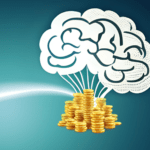
4 Powerful Cognitive Benefits of Daydreaming
Daydreaming isn’t just relaxing, it’s highly beneficial for how you learn and think. Read on to see how and what to do.

“Daydream because you can’t accomplish what you’ve never fully imagined.” – Anonymous zen quote
Have you ever found yourself gazing out a window and losing track of time and your sense of awareness? Have you chastised yourself after as wasting time? Don’t. It was time well spent.
Many of us are taught to believe that daydreaming is an unproductive bad habit that should be discouraged. The opposite is true. Daydreaming is freedom — and it’s part of the magic of our human experience. And beyond how good it feels to take a break from an active task, the benefits of daydreaming on your brain and health are vast. Research cognitive research indeed proves that our stigma about daydreaming is not warrant.
One recent study by Dr. Eric Schumacher and Christine Goodwin at Georgia Tech found that daydreamers are smarter, more creative and have active brains.
So give yourself the permission to go off script, and reap the benefits.
How does daydreaming work?
Before we get into the cognitive benefits of daydreaming, let’s talk about what daydreaming actually is.
A study published in Psychological Science by researchers from the University of Wisconsin and the Max Planck Institute for Human Cognitive and Brain Science, discuss daydreaming as a critical function of our working memory.
When your mind lapses into internal thoughts, memories, or future plans, you become less aware of your external environment. Your attention shifts from the moment into a place of your own. Essentially your transitioning from the physical realm to an inner world. And psychologists agree this is a hallmark of an active, engaged brain.
One key caveat here is that if your inner thoughts are worrying or stress-inducing, then that is not daydreaming. Daydreaming is not added pressure, anxiety, overwhelm or to-do lists. It is not about emotional shame or guilt. It is inherently light and relaxed. So only when the inner realm of your thoughts is here — in freedom, abstract imagery, and calm recollection or positive ideas about the future can we call it daydreaming. Otherwise, it is worry — a wholly unproductive disruption and not conducing to wellbeing.
4 Cognitive Benefits of Daydreaming
While daydreaming is a state of mind that occurs unintentionally, and not something you have to schedule, it’s worth mentioning that many smart people do create intentional blocks of time to reflect or contemplate in an unrestrictive stream of consciousness style without engaging in anything else.
They are intentional daydreamers. You can make time for it too, and observe how it impacts you. See if you experience these benefits right away or if they are delayed.
#1 – Heightened focus
When you daydream (again not worry or any active busy thought), you’ll find an actual boost in your focus when you return to the task at hand.
This is particularly true of more complex cognitive tasks like research, brainstorming, problem-solving, and writing or explaining difficult concepts. This is because your brain, already using 20% of your energy intake baseline, requires more energy for complexity.
But it’s not just a physical energy depletion, it’s mental stamina that gets drained. Our brains work in rhythms and they can only go so long without rest. However, most of the so-called ‘rest’ we take now is actually in the form of tech and other distractions, which exacerbate its cognitive overload.
Daydreams, on the other hand, relieve the cognitive overload as opposed to adding to it.
#2 – Learning and Memory
Your tendency to daydream is directly correlated with your brain’s ability to retain and recall information. In the aforementioned Max Planck study, students were given a monotonous task followed by a series of complex math and memory problems. Those who daydreamed during the rote task, performed better and remembered more.
This is because the right brain and subconscious were already engaged. So rote tasks are also an opportunity to flex your daydreaming muscles.

#3 – Improved mental health
Another cognitive benefit of daydreaming is that it offers a host of benefits on your mental health. Again, because this is free, unscripted time for the brain, it stays engaged while being in a fully rested state.
Since the majority of our thoughts are repetitive and many of these stem from evolutionary negativity bias which feeds our worry and activates stress mechanisms, daydreaming is an ideal antidote.
Pleasant thoughts also help to release endorphins to counter and down-regulate chronic stress.
#4 – Creativity and problem solving
There are a multitude of great minds, who credit daydreaming to their best ideas. As a former patent attorney, I’ve come across several instances where patent inventions, which require novelty for patentability, were born from an applicant’s out-of-the-blue daydreaming session.
Post-it notes are a staple in our work lives – we even use the digital version of these on our smart phones. Their creator — Arthur Fry — thought of the idea while daydreaming in church. The idea of duplicating DNA fragments by Kary Mullis, which earned him a Nobel Prize in chemistry was also a result of daydreaming.
Einstein was a big fan of daydreaming. And Silicon Valley is jam packed with entrepreneurs, whose original idea inception started in a daydream.
HOW TO PRACTICE DAYDREAMING?
As we can see from above, daydreaming often sets the foundation for creating and crafting new things. It helps your creative energy flow and opens your thoughts up for nonlinear possibilities. Here’s a few tips you can use to practice daydreaming:
Let your imagination run wild — Set some time aside in your busy schedule to let your imagination run wild. It could be during your tea break or a nature walk. You’ll be amazed at how it unleashes your innovative powers.
Pivot your attention away from the world around you — Unfocus your attention from the present moment and wander into the space of your mind with a wild, positive scenario. This, constructive daydreaming is a way to pick up the trail from a conscious thought to the abstract connections it can form across your neural networks.
CREATING MOMENTUM WITH PRACTICE
These days, we are daydreaming less and using technology as a distraction. Ironically daydreaming has a negative reputation while technology is deemed okay. But all the research on how tech impacts us plus the cognitive benefits of daydreaming prove that it’s better to zone out and let your mind wander.
When you allow your thoughts to wander, you give your mind the opportunity to find solutions for your challenges or even bigger solutions to larger problems that can impact communities and society for the better. Just put it into practice. That right there – your implementation of this is the key. Once you get going, you’ll feel no desire to turn back.
Next steps to consider
Experience the extraordinary with our groundbreaking neuroperformance programs. Over the course of just 12 weeks, witness a remarkable transformation that permeates every facet of your life: career, daily performance, health, wellness, cognitive function, habits, relationships, energy, and personal and spiritual growth. What sets us apart is our unwavering focus on the brain as the ultimate catalyst for change.
Unleash your full potential as we guide you through a journey of learning, self-discovery, and profound metamorphosis into your highest self. To witness the magic firsthand, explore our home-page brimming with captivating videos that promise to inspire and revolutionize your life. Take the first step today and embark on the path to unlocking your true potential. Explore our programs now.
Join our Alive Mindful Optimist Newsletter
Receive our Modern Day Stress Warrior Series & Mindfulness handouts as our gift to you.










